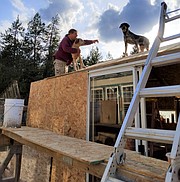13 dogs seized from Athol property.
ATHOL — Thomas Nafe and his wife were awakened Wednesday morning to several law enforcement vehicles coming up their driveway.
“We were horrified,” Nafe told The Press in a phone interview Friday.
Thirteen dogs were seized because he did not have a kennel license.
Nafe, who surrendered 10 dogs last month, said he was heartbroken that the last of his dogs were removed from his Athol property, which he has called home for about 25 years.
“I love these dogs,” he said in phone interview with The Press on Friday. “I want to get the best I can for them.”
It was a culmination of a long-running issue with authorities over the number of dogs on his property.
Kootenai County residents must obtain a kennel license in order to keep more than five dogs. Kennel facilities must meet certain standards, outlined in county code.
All dogs age 6 months and older must be vaccinated against rabies in Kootenai County.
Court documents indicate that, over the last five years, animal control officers have repeatedly advised Nafe to comply with county ordinances related to his dogs.
Since 2019, Nafe has received citations and faced numerous criminal charges related to failures to vaccinate his adult dogs or obtain a kennel license, most of which were eventually dismissed.
Animal control officers cited Nafe once again in July 2022 for failure to vaccinate his dogs and for operating an unlicensed kennel. Nafe had recently applied for a license but was denied, according to court records.
The case is pending. Nafe told a judge March 1 that he had rehomed five dogs and expected to find homes for another 18 dogs before May, when the case is scheduled to go to trial.
But Kootenai County Sheriff’s Office personnel arrived with a warrant Wednesday for the removal of all dogs on the property. Most, reportedly hounds, were taken to the Post Falls animal shelter.
The dogs were generally in good condition, said Lt. Zachary P. Sifford.
Jenna Redheart, director of the Idaho Animal Rescue Network in Lewiston, said Nafe asked for help with his dogs in January. She said they delivered several hundred pounds of dog food to him.
When Nafe surrendered 10 dogs to KCSO animal control last month, IARN transported some of them to animal rescues in southern Idaho.
Two of the females turned out to be pregnant and currently are with the Humane Society of the Palouse. Foster homes are being sought for them.
Redheart said she thought the situation dragged on too long.
"It was very messy all the way around," she said.
A video was taken by IARN during its January visit to Nafe's property and sent to KCSO. It was “key evidence used for the drafting of the search warrant to seize the dogs from Nafe,” according to a statement from KCSO.
Sifford said KCSO had received complaints from neighbors about the dogs barking and running loose.
Nafe said he and his wife cooperated Wednesday and brought the dogs out one at a time. He said it was difficult to say goodbye.
Nafe said he tried to hide one named Gizmo in a truck, but it was found when it stood up.
Nafe cried and said he had Gizmo for about nine years.
“I miss him so much,” he said. “This is so awful.”
Nafe said he has raised and sold American foxhounds for more than 10 years on his 11 acres.
“It’s a retirement project for me,” he said.
He said they charge a small amount or ask potential adopters to donate dog food. They try to make sure it is a good match.
He said it’s never been about money.
“Always the dogs,” he said.
He said the American foxhounds are high-energy. They can be a handful when they are young, but when they mature, they are wonderful. He said he had some for several years.
“I love them all,” he said.
Nafe said he has been working the last couple years to reduce the dog population on his property. It has been as high as about 30, but has generally been around 10 to 15.
He said in the past few months he’s sought assistance to feed them as costs were rising.
It also became more difficult to find good homes for them, and some were returned.
“That happened enough to increase the population,” he said.
His dogs were treated well, were not kept in kennels, Nafe said. Most were kept in an enclosed, two-story wooden structure and also had room to roam, sharing the land with other animals.
“We took care of them 100% ourselves for years,” he said.
Nafe said he misses his dogs and hopes to get some of them back.
“We’ve given everything we have to these dogs,” he said.



